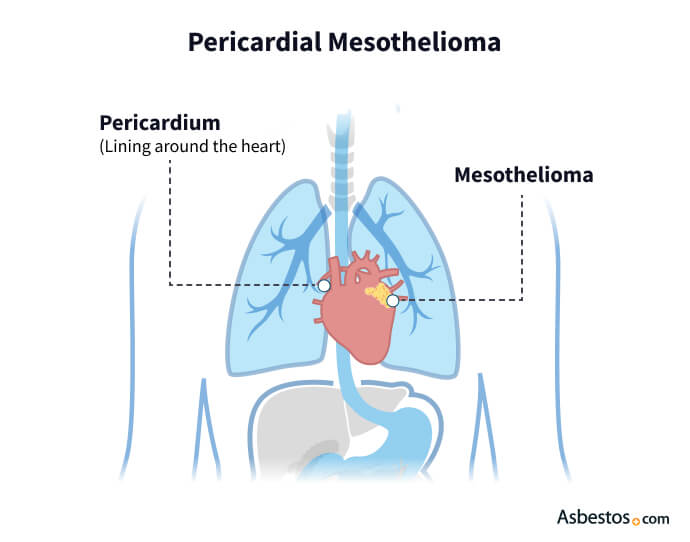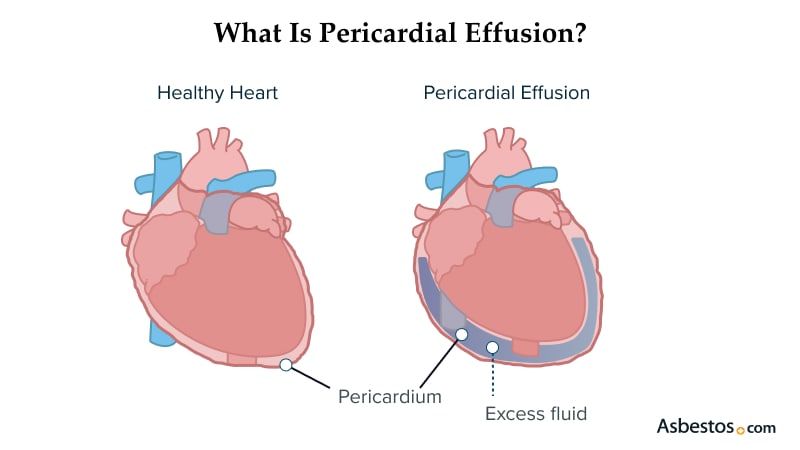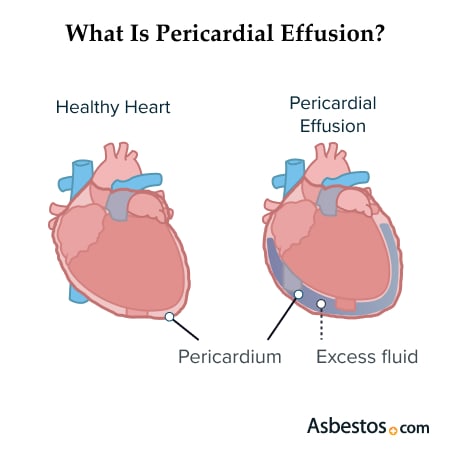Get in Touch
Have questions? Call or chat with our Patient Advocates for answers.
Pericardial mesothelioma is a cancer that forms in the sac around the heart. Occupational asbestos exposure is linked to this type of cancer. Treatment aims to control tumor growth with surgery and chemotherapy. The 1-year survival rate is around 26%.
Written by Sean Marchese, MS, RN | Edited By Walter Pacheco | Last Update: October 18, 2024
Pericardial mesothelioma is a rare cancer that affects the heart’s lining, the pericardium. Less than 1% of all types of mesothelioma are pericardial.
Asbestos exposure causes pericardial mesothelioma. It’s not known how asbestos fibers reach the heart. However, researchers are studying the cancer’s development.
People with pericardial mesothelioma may show symptoms at a later stage. Symptoms can include chest pain, fatigue and shortness of breath. These sign are like those of other heart disorders. So diagnosing pericardial mesothelioma is challenging.
Pericardial treatment options primarily include surgery and chemotherapy. A 2023 report in BMC Cardiovascular Disorders says most patients live for 3 to 10 months. Survival rates are low, but some patients can live years after surgery or chemotherapy.

Pericardial mesothelioma is caused by asbestos exposure. Researchers suspect asbestos fibers travel through the bloodstream to the heart lining. Over time, these fibers cause inflammation and genetic mutations. This damage can lead to mesothelioma tumor development.
A 2020 study in the Scandinavian Journal of Work, Environment & Health confirmed the connection. It found that occupational asbestos exposure is significantly associated with pericardial mesothelioma.
Researchers reported cases linked with occupational asbestos exposure by gender. About 24% of women and 75% of men with pericardial mesothelioma worked around asbestos. Industries at high risk of asbestos exposure included construction, metal works, textiles and agriculture.
Other risk factors are similar to those of other types of mesothelioma. These factors include exposure to radiation, SV40 virus, tuberculosis and erionite.
Common pericardial mesothelioma symptoms include difficulty breathing, chest pain and heart palpitations. Fluid buildup around the heart and thickening of the pericardial layers also cause symptoms.
Most pericardial mesothelioma patients have no symptoms at first. This fact contributes to a late-stage diagnosis. The signs of pericardial mesothelioma can also resemble those of other heart conditions. This similarity makes it difficult to diagnose.
A 2024 case report listed cough, difficulty breathing and abdominal pain as a patient’s symptoms. The report appeared in the Journal of Surgical Case Reports. If you have symptoms, see your doctor right away. Screening tests can find the cause of these health problems.
“Pericardial mesothelioma can present with heart failure initially,” says Dr. Wickii Vigneswaran, a thoracic surgeon at the Loyola University Medical Center. “You’re not suspecting mesothelioma. You are going to find pericardial effusion or heart failure. Or the other way it presents is what we call constrictive pericarditis.”
A physical exam and imaging tests can find pericardial mesothelioma tumors. A biopsy can confirm whether they are cancerous. Pericardial mesothelioma is often diagnosed after surgery or during an autopsy.
Doctors will also assess your symptoms, medical history and current medical condition. Experts diagnose about 25% of cases before a patient dies. Cytology tests of pericardial fluid can sometimes show cancer cells. But a biopsy obtained through surgery is more reliable. Other methods may lead to a misdiagnosis.
It’s vital to meet with a specialist. They must confirm a pericardial mesothelioma diagnosis. A mesothelioma expert will know more about this rare cancer. They can ensure an accurate diagnosis and prompt treatment.
If you have been diagnosed with any of these conditions, always seek a specialist. Mesothelioma oncologists and cardiothoracic surgeons can diagnose and treat pericardial mesothelioma. These experts can recommend new therapies and clinical trials that may improve survival.
Mesothelioma treatment for pericardial mesothelioma includes surgery and chemotherapy. The heart lining rests close to the heart and limits treatment options.
Surgery is the most effective treatment for this cancer, but more than half of patients are not eligible. In rare cases of an early diagnosis, surgery may be able to remove tumors. The primary surgical treatment option for pericardial mesothelioma are pericardiectomy and tumor removal. It is also called a pericardial window.
Chemotherapy and radiation can slow tumor growth. Palliative treatment can ease symptoms. Immunotherapy has been tried in some patients with heart failure. It had limited success.
Pericardial mesothelioma patients who are good candidates for surgery may undergo a pericardiectomy. This is also called a pericardial window. A pericardiectomy removes part or all of the pericardium along with tumors. This surgery relieves pressure and minimizes fluid buildup.
In 2024, Translational Cancer Research reported a patient survival of 2.5 years following a pericardiectomy. According to a 2018 report in The Annals of Thoracic Surgery, another patient was alive four years after a pericardiectomy. The patient experienced a recurrence that was successfully treated with another surgery.
The benefits of chemotherapy are minimal for most patients with pericardial mesothelioma. The chemotherapy drugs pemetrexed and cisplatin may improve survival. Gemcitabine has produced mixed results. Recent case reports show the addition of bevacizumab to chemotherapy for certain patients. A handful of cases have responded well to chemotherapy.
Radiation therapy has been used to control pericardial mesothelioma growth and improve pain. This treatment carries a higher risk near the heart. For this reason, radiologists use advanced techniques for delivering radiation.
For example, doctors can use volumetric modulated arc therapy to treat a tumor recurrence. They can also apply radiation after surgeons remove tumors. A patient received this treatment in a 2021 case report in Advances in Radiation Oncology.
Palliative treatment options aim to minimize pain and reduce symptoms for people with pericardial mesothelioma. This care can improve the quality of life and make patients more comfortable. Radiation and chemotherapy may be used in palliative care. They can shrink tumors, prevent recurrence and improve symptoms.


Fluid buildup in the pericardium is the primary cause of symptoms. This condition is called pericardial effusion. A pericardiocentesis removes excess fluid to relieve pain and pressure around the heart. Pain medication can also reduce symptoms and improve comfort.
The prognosis for pericardial mesothelioma is poor compared to peritoneal or pleural mesothelioma. Nearly 50% to 60% of pericardial patients die within six months of diagnosis. However, this is not the case for everyone. About 26% of patients live for one year or more. A 2024 case report says survival time is around 2.5 years. The 5-year survival rate for pericardial mesothelioma is 9%.
Research shows minor benefits from chemotherapy, except for one case. A 47-year-old woman lived two years after chemotherapy with cisplatin, gemcitabine and vinorelbine. In 2024, Frontiers in Cardiovascular Medicine described a patient who refused surgery. They opted for chemotherapy with bevacizumab. He lived for about one year.
Hope for a better life expectancy exists for some patients because of positive results from surgery. Surgery combined with other therapies has helped some patients live for years. A 1995 case report described a 27-year-old woman who underwent surgery and radiation therapy. She had no evidence of recurrence during 28 years of follow-up.

Gain access to top mesothelioma doctors and get help scheduling appointments.
Connect NowHelpful resources and coping strategies are available for patients and their loved ones. Coping with pericardial mesothelioma can be challenging. Effective coping strategies can manage symptoms and improve quality of life.
These resources can help patients better understand their condition and treatment options. They can also help them cope with the disease’s physical and emotional challenges.
Pericardial mesothelioma tumors cause thickening of the heart lining and fluid buildup. The fluid pressure restricts the heart’s ability to pump effectively, leading to symptoms like chest pain and arrhythmias.
Pericardial mesothelioma is linked to asbestos exposure like other types of mesothelioma. People with pleural, peritoneal and testicular types also have a history of asbestos exposure.
The initial signs include chest pain, shortness of breath, and irregular heartbeat. These symptoms develop as the cancer grows and leads to fluid buildup around the heart. Because these signs mimic other heart conditions, diagnosis is often delayed until the disease is more advanced.
Few trials focus only on recruiting patients with pericardial mesothelioma. That’s because it is rare. But these patients may qualify for trials that compare heart procedures or test new cancer drugs. Participation may provide access to cutting-edge treatments.
Asbestos exposure is proven through work history and medical documents. Exposure evidence may include working at or living near asbestos job sites. A mesothelioma biopsy can show asbestos fibers. This may be submitted as medical evidence.
Maintaining a healthy lifestyle can help patients get through aggressive cancer treatment. Electing treatment for pericardial mesothelioma has the biggest impact on your prognosis. Proper nutrition, regular exercise and avoiding smoking may improve your response to treatment.
Your web browser is no longer supported by Microsoft. Update your browser for more security, speed and compatibility.
If you are looking for mesothelioma support, please contact our Patient Advocates at (855) 404-4592
The Mesothelioma Center at Asbestos.com has provided patients and their loved ones the most updated and reliable information on mesothelioma and asbestos exposure since 2006.
Our team of Patient Advocates includes a medical doctor, a registered nurse, health services administrators, veterans, VA-accredited Claims Agents, an oncology patient navigator and hospice care expert. Their combined expertise means we help any mesothelioma patient or loved one through every step of their cancer journey.
More than 30 contributors, including mesothelioma doctors, survivors, health care professionals and other experts, have peer-reviewed our website and written unique research-driven articles to ensure you get the highest-quality medical and health information.
My family has only the highest compliment for the assistance and support that we received from The Mesothelioma Center. This is a staff of compassionate and knowledgeable individuals who respect what your family is experiencing and who go the extra mile to make an unfortunate diagnosis less stressful. Information and assistance were provided by The Mesothelioma Center at no cost to our family.LashawnMesothelioma patient’s daughter


Marchese, S. (2024, October 18). Pericardial Mesothelioma. Asbestos.com. Retrieved October 22, 2024, from https://www.asbestos.com/mesothelioma/pericardial/
Marchese, Sean. "Pericardial Mesothelioma." Asbestos.com, 18 Oct 2024, https://www.asbestos.com/mesothelioma/pericardial/.
Marchese, Sean. "Pericardial Mesothelioma." Asbestos.com. Last modified October 18, 2024. https://www.asbestos.com/mesothelioma/pericardial/.
Mesothelioma Center - Vital Services for Cancer Patients & Families doesn’t believe in selling customer information. However, as required by the new California Consumer Privacy Act (CCPA), you may record your preference to view or remove your personal information by completing the form below.
